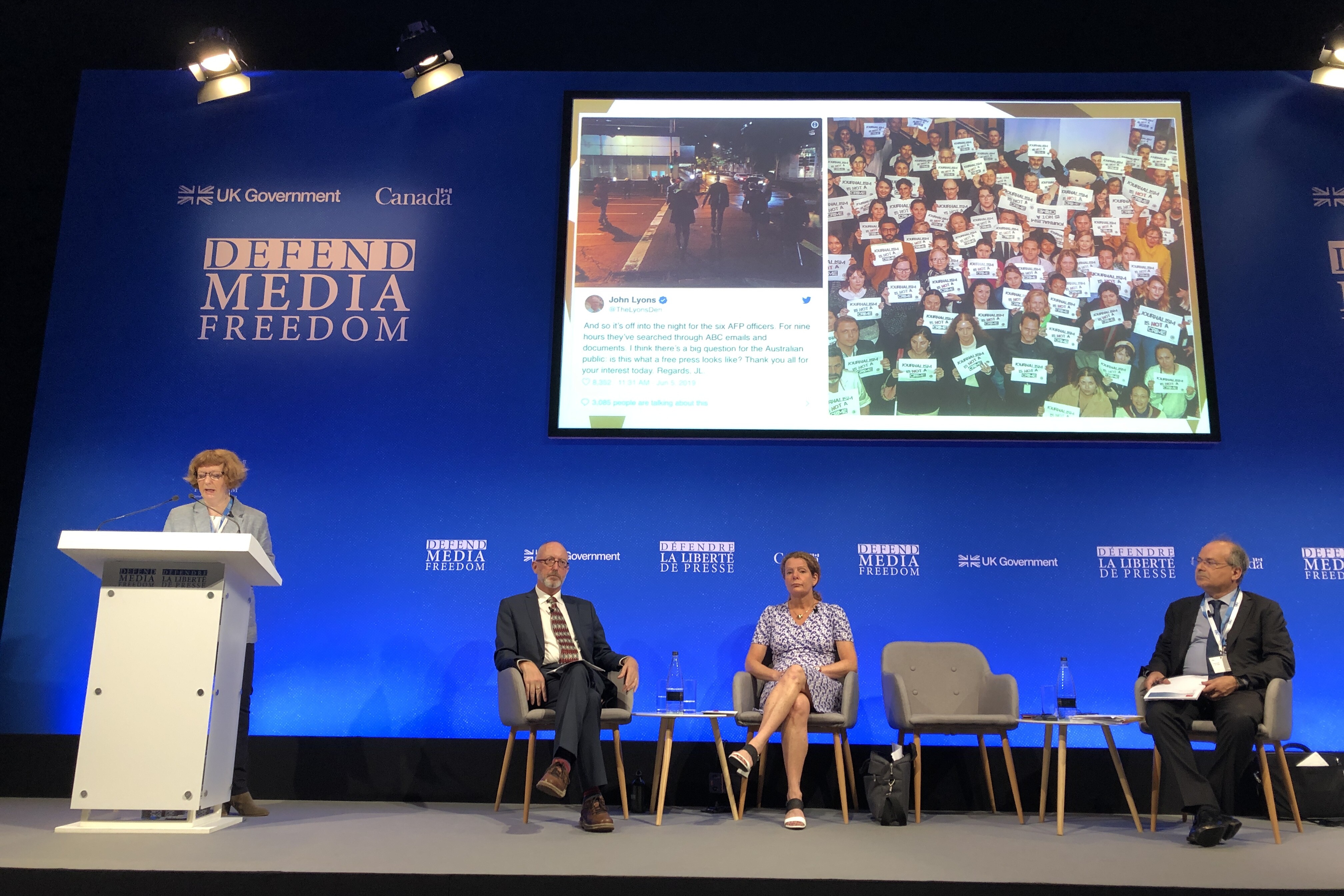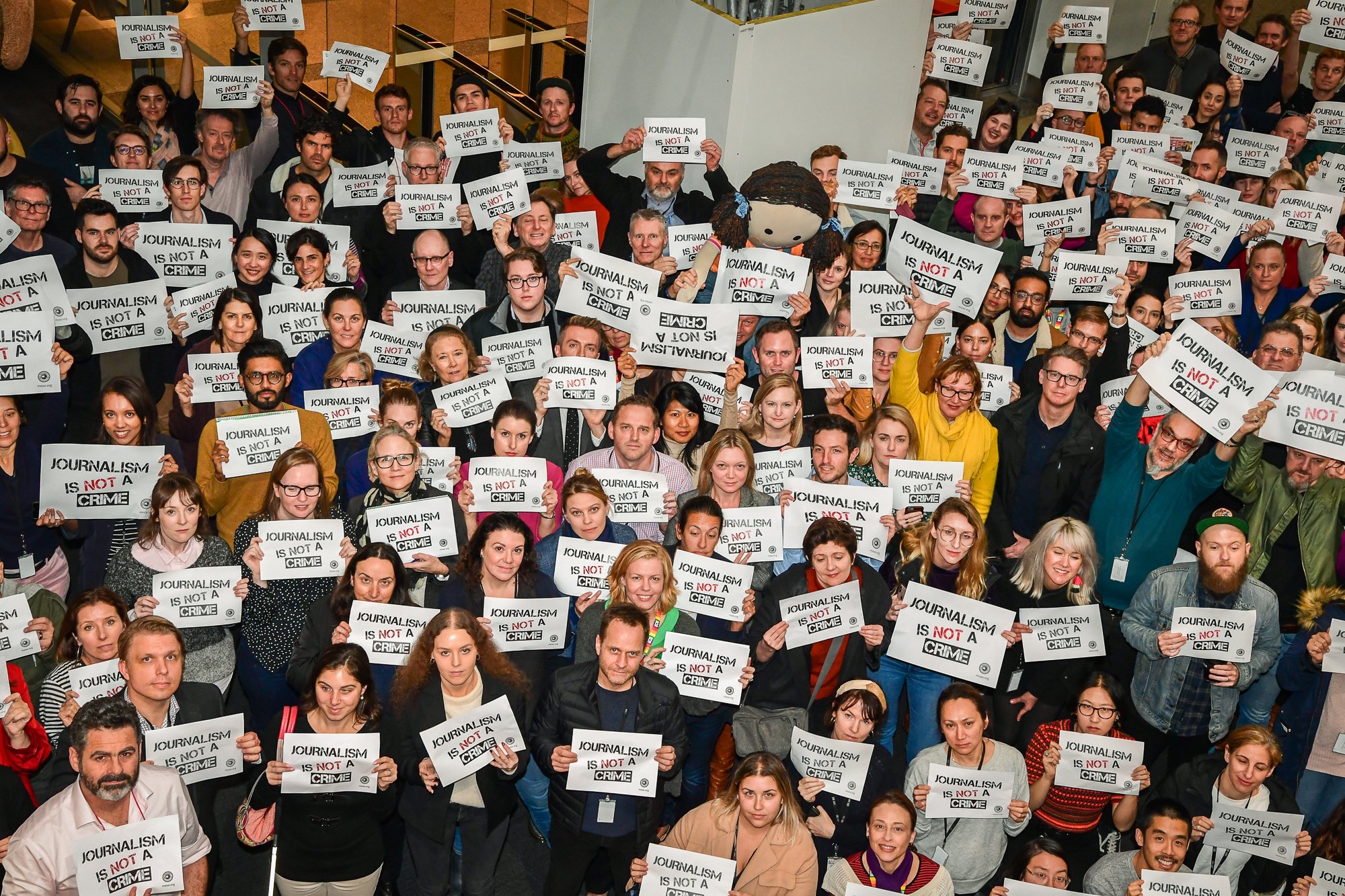Press Release
The International Day to End Impunity for Crimes against Journalists on November 2 brings to the public’s attention crimes against journalists all over the world.
This day, with its rather unwieldy name, helps to highlight the seriousness of the situation – that in many parts of the world, people threaten, harass and even kill journalists without being punished for it. Something that is wholly unacceptable and which not only has tragic consequences for the relatives and associates of the victims, but also impacts all of us who want to live in open, democratic societies.
Last year, UNESCO launched a website – an “Observatory of Killed Journalists” – which brings together the names of the journalists who have been murdered since 1993. At the time of writing, they number 1360. So far this year alone, the figure is 43 men and women from all over the world. Behind each and every chilling number, from 1 to 1360, lies a life that has been extinguished, a voice that has been silenced, and a journalistic mission that is no longer being carried out in countries such as Mexico, Afghanistan, the Philippines, Ukraine and Honduras. The list is long, and the number of unreported cases is also large.
Even if murdered colleagues are not part of the everyday experience for journalists in Sweden, a country with a long and strong tradition of freedom of the press and freedom of expression, we are seeing hate speech and threats against journalists increasing here too. According to a survey conducted last spring by the University of Gothenburg, 30 per cent of the Swedish journalists who responded to the survey had received threats within the last 12 months. A parallel trend noted is that in recent years journalists have been approaching the security departments of their organisations when they are threatened more so than in the past, rather than reporting the matter to the police.
Earlier this autumn, a school official in the Swedish city Växjö was sentenced for threatening one of Swedish Radio’s reporters, who was at the school to talk with disaffected students. This person shoved the reporter into a corner and tried to forcibly take from him notes and recording equipment containing source-protected material.
The reporter was there to do his job: to hold power to account and listen to the students who were also in a situation of dependency in relation to the school. For Swedish Radio, the obvious thing to do was report the matter to the police, just as we always encourage our co-workers to do. A prosecutor chose to indict – a clear indication that this was a crime to be taken very seriously. The school official was convicted in September by the District Court for serious arbitrary conduct, receiving a conditional sentence and day-fines equivalent to six months in prison, according to the District Court.
It sends an important message that there is a limit on what a society will tolerate, at a time when there is increasing polarisation, journalists are being singled out as enemies and democratic values are at stake. But the line in the sand needs to be drawn more starkly, the message needs to be clearer and this cannot wait.
But the line in the sand needs to be drawn more starkly, the message needs to be clearer and this cannot wait.
Today, we have legislation in Sweden which means that the same penalty applies to threatening a private individual as it does to threatening a journalist. Both are serious crimes, and of course it is never acceptable to threaten anyone. But the consequences of threatening a journalist are far greater. Such a threat has repercussions for the foundations of democracy – the will to ask questions and investigate, and ultimately for our open society. The survey conducted by the University of Gothenburg, as well as experiences from my own workplace at Swedish Radio, show that journalists – consciously or unconsciously – are less inclined to cover certain areas or topics to avoid exposing themselves and their families to hatred and threats. This makes the issue of the safety and security of journalists incredibly important and urgent. A society that falls silent becomes a poorer and less democratic society for all of us.
It is a hopeful sign that the Prime Minister of Sweden, Stefan Löfven, in the Statement of Government Policy of 10 September 2019, expressly stated that “journalists must be given stronger protection under criminal law against threats and hate speech to enable them to fulfil their vital role in a democracy”, but it is also important to continue to highlight this issue with the Government, urging it to act as soon as possible.
As a representative of a media company and as ultimately responsible for journalists who are doing their jobs every day – in spite of high pressure and verbal and physical threats – it is important for me to do all I can to actually get legislation in place that strengthens their protection. Well-formulated action plans and fine words are simply not enough.
It is important that threats, hate speech, harassment and violence against journalists lead to prosecution and punishment under the rule of law. And this applies to Sweden as much as to the rest of the world.
Cilla Benkö, Director-General, Swedish Radio
Previously published in the Swedish newspaper Dagens Nyheter.
Source: Sveriges Radio
PMA thanks Sveriges Radio and Cilla Benkö for allowing us to publish this report.
Sveriges Radio and the Public Media Alliance have worked together to promote the interdependent values and role of public media and media freedom at the Global Conference for Media Freedom. Read more below.
Press Release
Sveriges Radios VD Cilla Benkö: Brott Mot Journalister Måste Straffas Hårdare
2019 är den skrämmande verkligheten att det på många håll i världen går att hota, trakassera och till och med döda en journalist utan att straffas för det. Den 2 november är det den internationella dagen mot just straffrihet för brott mot journalister.
Unesco lanserade förra året en hemsida – ett ”Observatory of Killed Journalists” (kan översättas ungefär med ”observatorium över dödade journalister”) – som samlar namnen på de journalister som mördats sedan 1993. Det är i skrivande stund 1360 stycken. 43 stycken hittills i år (31 oktober), kvinnor och män från hela världen. Bakom varje nattsvart siffra, från 1 till 1360, finns ett liv som släckts, en röst som tystats och ett journalistiskt uppdrag som inte längre utförs i länder som Mexiko, Afghanistan, Filippinerna, Ukraina och Honduras. Listan är lång och mörkertalet är dessutom stort, alla som mördats finns inte med på listan.
Även om mördade kollegor inte hör till vardagen för journalister i Sverige, ett land med en lång och stark press- och yttrandefrihetstradition, ser vi att hatet och hoten mot journalister ökar även här. Enligt en undersökning från i våras från Göteborgs Universitet har 30 procent av de tillfrågade svenska journalisterna mottagit hot under det senaste året. Parallellt tenderar journalister under senare år i högre grad än tidigare att vända sig till säkerhetsavdelningarna på sina företag när de hotas, snarare än att anmäla till polisen.
Tidigare i höstas dömdes en skolföreträdare i Växjö för att ha hotat en av Sveriges Radios reportrar som befann sig på skolan för att prata med missnöjda elever. Skolföreträdaren trängde in reportern i ett hörn och försökte handgripligen frånta honom arbetsmaterial, anteckningar och inspelningsutrustning med källskyddat material.
Reportern var där för att göra sitt jobb: att granska makten och lyssna på de elever som dessutom befann sig i beroendeställning till skolan. För Sveriges Radios del var det självklart att polisanmäla, precis som vi alltid uppmanar medarbetare att anmäla. En åklagare valde att åtala och visade därigenom att det var ett brott som togs på allra största allvar. Skolföreträdaren dömdes i september av tingsrätten för grovt egenmäktigt förfarande till villkorlig dom och dagsböter, enligt tingsrätten motsvarande sex månaders fängelse.
Det är en viktig signal att det finns en gräns för vad ett samhälle tolererar, i en tid när tonläget hårdnar, journalister pekas ut som fiender och demokratiska värden står på spel. Men gränsen behöver dras hårdare, signalerna bli tydligare, och det kan inte vänta.
I dag har vi en lagstiftning i Sverige som innebär att det ger samma straff att hota en privatperson som att hota en journalist. Bägge brotten är allvarliga, självklart är det aldrig acceptabelt att hota någon, men konsekvenserna av att hota en journalist är betydligt större. Det påverkar demokratins förutsättningar, viljan att granska och i förlängningen vårt öppna samhälle. Undersökningen från Göteborgs universitet , liksom erfarenheter från min egen arbetsplats Sveriges Radio, visar att journalister i ökad utsträckning – medvetet eller omedvetet – väljer bort bevakningsområden för att på så sätt slippa utsätta sig själva och sina familjer för hat och hot. Det gör frågan om journalisters säkerhet oerhört angelägen och brådskande. Ett samhälle som tystnar blir ett sämre och mindre demokratiskt samhälle för oss alla.
Det är hoppfullt att Sveriges statsminister Stefan Löfven i Regeringsförklaringen den 10 september uttryckligen betonade att ”journalister måste få ett starkare straffrättsligt skydd mot hot och hat för att kunna fullgöra sina för demokratin avgörande uppgifter”, men det är samtidigt viktigt att fortsätta att driva på gentemot regeringen och övriga partier, som bör agera skyndsamt.
Som representant för ett mediebolag, och som ytterst ansvarig för journalister som varje dag gör sina jobb – trots hårda påtryckningar, verbala och fysiska hot – är det angeläget för mig att göra allt jag kan för att faktiskt få en lagstiftning på plats som stärker skyddet. Välformulerade handlingsplaner och fina ord räcker inte.
Det är viktigt att hot, hat, trakasserier och våld mot journalister leder till åtal, och straff. Och det gäller i Sverige liksom över hela världen.
Cilla Benkö, vd Sveriges Radio
Source: Sveriges Radio
PMA thanks Sveriges Radio and Cilla Benkö for allowing us to publish this report.
Sveriges Radio and the Public Media Alliance have worked together to promote the interdependent values and role of public media and media freedom at the Global Conference for Media Freedom. Read more below.
Related Posts
12th August 2019
Why Public Media Matters: Report from the Global Conference for Media Freedom
Dr Caitriona Noonan explores the value…

